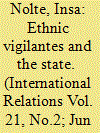| Srl | Item |
| 1 |
ID:
077391


|
|
|
|
|
| Publication |
2007.
|
| Summary/Abstract |
Based on the example of the Oodua People's Congress (OPC) in Nigeria, this article argues that vigilante activities are embedded in a range of social relations and historical trajectories. While vigilantism transforms relationships of power within the state, it does not necessarily undermine all aspects of state authority. After the annulled presidential election of a Yoruba speaker in 1993, the OPC was founded with the explicit political aim of safeguarding Yoruba ethno-nationalist interests vis-à-vis the state. By fighting crime, and state institutions perceived to be implicated in the perpetration of crime, including the police and military, the OPC's vigilantes have undermined and challenged the state's security institutions. Representing the state as both weak and strong, the OPC has undermined the state's control of security but legitimised and strengthened the state as a mechanism of political decision-making and social reform.
|
|
|
|
|
|
|
|
|
|
|
|
|
|
|
|
| 2 |
ID:
147234


|
|
|
|
|
| Summary/Abstract |
This research note argues that quantitative survey data on Africa, welcomed by most researchers in public health, economics, and political science, can make an important contribution to the work of historians and anthropologists, especially if it is open to critical analysis. The research note describes the 2012–13 ‘Knowing Each Other’ survey on religion among the Yoruba of south-west Nigeria, which provides strong evidence for a slow shift from Islam to Christianity in the area since 1963, and reflects on the methods and challenges of carrying out the survey and the resulting biases within it. In doing so, the research note draws out lessons on how to use surveys for historical and anthropological research. It also shows how using surveys contributes to understanding the complex and unexplored dynamics of Muslim–Christian relations in Nigeria from the perspectives of locality, age, and gender.
|
|
|
|
|
|
|
|
|
|
|
|
|
|
|
|